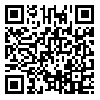BibTeX | RIS | EndNote | Medlars | ProCite | Reference Manager | RefWorks
Send citation to:
URL: http://jfqhc.ssu.ac.ir/article-1-202-en.html
Background: Unlike industrially production, Iranian traditional doogh are not pasteurized after production. Hence, possible contamination with different pathogenic bacteria may occur during production or post-production of traditional doogh. The aim of the present study was to monitor the behavior of Escherichia coli O157:H7 and Listeria monocytogenes in traditional Iranian doogh at different temperatures and time periods.
Methods: Low acid and high acid doogh samples were inoculated with approximately 4 and 6 log cfu/ml of each pathogen separately and incubated at 4 ºC and 25 ºC. At different time interval, samples were taken to enumerate E. coli O157:H7 and L. monocytogenes and determine titratable acidity. Results were analyzed by ANOVA test using SPSS software (v. 16.0).
Results: Although the survival ability of E. coli O157:H7 in doogh samples was slightly higher than L. monocytogenes, both of them were detected in low acid doogh sample after 10-14 days at 4 ºC. However, they were not detected in low acid doogh samples for more than 2 days at 25 ºC. In contrast, in high acid doogh samples, the viability of E. coli O157:H7 and L. monocytogenes declined more quickly to undetectable level, both at 4 ºC and 25 ºC indicating less viability of these bacteria in high acid doogh samples compared to those of low acid ones (p<0.05).
Conclusion: Traditional Iranian doogh should be considered as a potential vehicle of transmission of E. coli O157:H7 and L. monocytogenes, especially in low acid doogh samples when stored under refrigeration.
Received: 15/07/28 | Accepted: 15/11/02 | Published: 15/12/29
| Rights and permissions | |
 |
This work is licensed under a Creative Commons Attribution-NonCommercial 4.0 International License. |





